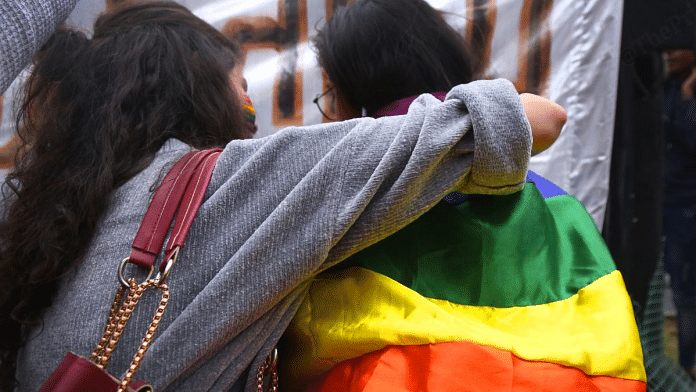New Delhi: The Supreme Court Tuesday refused to tweak the Special Marriage Act (SMA) to legalise same-sex marriage. It further refused to strike down Section 4 of the law to allow a non-heterosexual couple to marry under the law.
A five-judge bench led by Chief Justice of India (CJI) D.Y. Chandrachud agreed with the Centre’s view that tinkering with the law could have a cascading effect on other laws. The other members of the bench were justices S.K. Kaul, Ravindra Bhat, Hima Kohli and P.S. Narasimha.
Four opinions were authored by the bench. While CJI Chandrachud, Justices Kaul and Narasimha penned down their individual views, Justice Bhat wrote for himself and Justice Kohli.
The bench was unanimous in its ruling on not modifying or reading into the SMA to allow same-sex marriages in India. The judges, however, differed on whether the SMA was enacted with the sole objective for heterosexual marriages only.
The CJI and Justice Kaul said it wasn’t. But Justices Bhat, Kohli and Narasimha disagreed with this opinion, saying a gender-neutral interpretation of the SMA may not be equitable at times and can result in women being exposed to vulnerabilities in an unintended manner.
“If Section 4 is to be read in a gender-neutral manner, the interplay of other provisions will lead to anomalous results, rendering the Special Marriage Act unworkable,” stated the majority opinion.
But at the same time, the judges concurred that there cannot be an unqualified right to marry, which is to be treated as a fundamental right. However, they agreed that the right to choose a partner and cohabit was one.
By a 3:2 ruling, the bench turned down the petitioners’ claim to have a civil union. Both the CJI and Justice Kaul held the right to have a civil union flows from Part 3 of the Constitution. However, the majority view held otherwise to hold that such a union can only be done through a legislation.
All the judges advised the central government to act in terms of its proposal and set-up a high-powered committee headed by the cabinet secretary to address the raft of concerns of same-sex couples, including ration cards, pension, gratuity and succession.
There was a unanimous ruling on transgenders’ right to marry under the existing law.
With regard to adoption rules that were also under challenge, the CJI and Justice Kaul struck it down to permit adoption by queer couples. Justices Bhat, Kohli and Narasimha differed on this account, but added their decision should not be interpreted to say that queer couples are not fit to be parents.
Tuesday’s ruling comes four days before Justice Bhat’s retirement and five months after the Constitution bench had reserved verdict on a batch of petitions demanding legal recognition of same-sex marriages
The hearing on the petitions went on for 10 days before it concluded on 11 May and was reserved for judgment.
Also Read: SC cautious with same-sex marriage case. Keeping personal laws out is in state’s interest
Previous arguments
Extensive arguments were advanced from both sides — petitioners who asked for legal recognition of marriage between same-sex couples and the government that vehemently opposed the plea, arguing the legislative policy of the country has “consciously validated a union between a biological man and woman”.
While the petitioners stressed the equality right of the LGBTQIA+ for legal validation of same-sex marriages, the government challenged the petitions on the grounds of jurisdiction.
The central government has maintained that the petitioners’ request to grant legal validity to same-sex unions under the Special Marriage Act can only be looked into by Parliament and that the right to marry is not a fundamental right.
During the hearings, it had agreed to constitute an inter-ministerial committee, headed by the cabinet secretary, to examine the “administrative steps” that could be taken to ensure certain benefits for same-sex couples.
These benefits would remain even in the absence of a legal recognition of their marriage, Solicitor General Tushar Mehta had assured the bench, while urging the judges to refrain from issuing any declaration.
A judicial pronouncement, Mehta had warned, would have an uncontrollable and unforeseen fallout. Hence, he urged the bench not to use discretion to declare any right.
“Any alteration or substitution of words in SMA, as was suggested by the petitioners, would impact a string of provisions in other statutes, apart from impacting personal laws,” he had argued.
Though the bench had categorically ruled out delving into the aspects of personal laws, Mehta said that tweaking the SMA would have a bearing on personal legislation as well.
The 10-day-hearing delved into the possible directions the court could issue, such as making the Special Marriage Act gender-neutral by tweaking certain words, issuing a declaration to affirm same-sex unions, while asking the government to grant this right through a legislative exercise, or granting constitutional status to right to marry and pass specific directions to implement this declaration.
While the hearing was on, the central government sought the views of the states on the subject. According to its report, Rajasthan, Assam and Andhra Pradesh opposed such unions, saying it was within the legislature’s domain to make laws, based on public opinions across religious faiths. Uttar Pradesh, Maharashtra, Manipur and Sikkim sought more time to formulate their views.
(Edited by Richa Mishra)
Also Read: 53% of Indians are accepting of same-sex marriage, finds global survey by Pew Research



